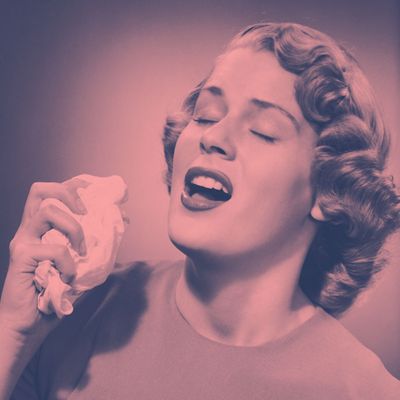
We’re now two days into spring, which, for some people, is purely good news: Warmer weather is almost upon us, as are sidewalks free of dirty slush piles. For others, though, these few transitional chilly weeks are marked by a sense of abject dread. Warmer weather means blooming things, and blooming things mean allergies, and allergies mean that no matter how nice it is to go outside without worrying about a jacket, the next few months are still going to straight-up suck.
For all the seasonal allergy sufferers out there — this is not a post that offers up a bright side. This is a post that contains, unfortunately, some more bad news to add to your sneezy, sniffly misery: Over-the-counter decongestants will only get you so far. As Women’s Health recently explained, the nasal sprays designed to de-clog your poor sinuses can actually make things worse, creating a condition called rhinitis medicamentosa, or “rebound congestion.”
Here’s how it works: Decongesting sprays work their magic by shrinking the inflamed blood vessels in your nasal passages, which allows air to flow through. But with frequent use — more than a few days in a row — those same blood cells come to rely a little too heavily on the drugs: “They start to swell beyond their normal size, because they’re waiting for the chemical hit,” Madeleine Schaberg, a physician at the New York Eye and Ear Infirmary of Mount Sinai, told Women’s Health. (If you’ve ever heard someone talk about being addicted to nasal spray, this is what they’re referring to.)
To avoid rebound congestion, the magazine explained, you’re better off using the nasal spray sparingly, and adding other decongesting treatments to your rotation, like saline rinses, antihistamines, and, in more severe cases, prescription steroids. And here’s a small scrap of comfort during this snotty time: Your springtime allergies could definitely be worse.




